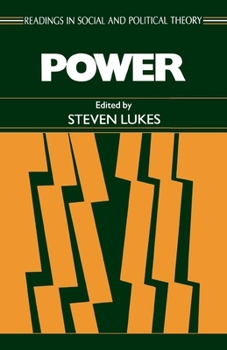Power
Select Format
Select Condition 
Book Overview
A collection of essential essays on political theories of power
Format:Paperback
Language:English
ISBN:0814750311
ISBN13:9780814750315
Release Date:November 1986
Publisher:New York University Press
Length:283 Pages
Weight:0.80 lbs.
Dimensions:0.8" x 5.4" x 8.2"
Customer Reviews
2 ratings
Power has three faces
Published by Thriftbooks.com User , 16 years ago
This is essential reading for those interested in the dynamics of power relations and, in particular, how power works to either enhance or undermine democratic participation in society. Over the course of the three essays that constitute the second edition of this book, Lukes develops an idea of power in three dimensions. In the first dimension, power is clearly visible in decision-making processes, where A exercises power over B when A's policy preferences, reflecting A's subjective interests, prevail over B's. Here, power is discernible only where a conflict of interests informs open debate over a public issue. This conflict gives rise to divergent policy preferences competing for public acceptance and political validation. However, if one were to confine the study of power to its effects in the first dimension, that is, to the outcomes of decision-making processes, one misses other aspects of power detected in the biases of non-decision-making. Non-decision-making power is the power to keep certain issues off the table: it is the power to deny certain individuals or groups access to decision-making processes, and thus to prevent certain grievances from being translated into public issues. While decision-making power, as seen in the first dimension, may be widely distributed among various groups and individuals who alternately succeed in promoting their interests, there may be at the same time unity among these otherwise conflicting interests in preventing certain segments of the population from contributing to the discussion. The second dimension of power consists in this ability to control the agenda, to decide what gets decided--and what doesn't. Here, as in power's first dimension, power is again seen in a conflict situation, only the conflict is now covert, rendered invisible by non-decision-making power. The third dimension of power incorporates and transcends power's first and second faces. Those who study three-dimensional power recognize not only power as it is exercised in the first and second dimensions but also power where it need not be so exercised. This occurs in the apparent absence of conflict, where power can be seen as the capacity to secure compliance to domination and thereby prevent conflicts or grievances from arising in the first place. The third face of power is not directly visible, because the securing of willing compliance to domination does not require an explicit exercise of power. However, the mechanisms of such power (domination) are empirically accessible. They may involve the furthering of the material interests of the dominated within certain limits, as part of a class compromise, or they may involve the inculcation of ideologies that bring the dominated to accept the power structure of society as the "natural order of things" or as being divinely ordained and established. In both cases, which are not mutually exclusive, the "true interests" of the dominated are obscured; and the dominated
Crystal clear social thought
Published by Thriftbooks.com User , 16 years ago
This is probably the clearest social science book I have ever read. Lukes deals with a vast topic and still manages to write a short and very precise book that gives a great overview about the standpoints in the discussion and presents an own convincing argument. The first part of the book was situated in a specific debate and only deals with the asymmetrical exercise of power by A over B. Lukes third view on power adds that power might be exercised even in the absence of conflict. For example by shaping other peoples interests. The next two chapters were written more recently and widen the focus to Power as a capacity and the question if power was a capacity, how can it be a meaningful and explanatory concept in the social sciences. This book is easy to read not because it is an easy introduction to the debate. It is easy to read, because Lukes formulates his argument with huge precision.





